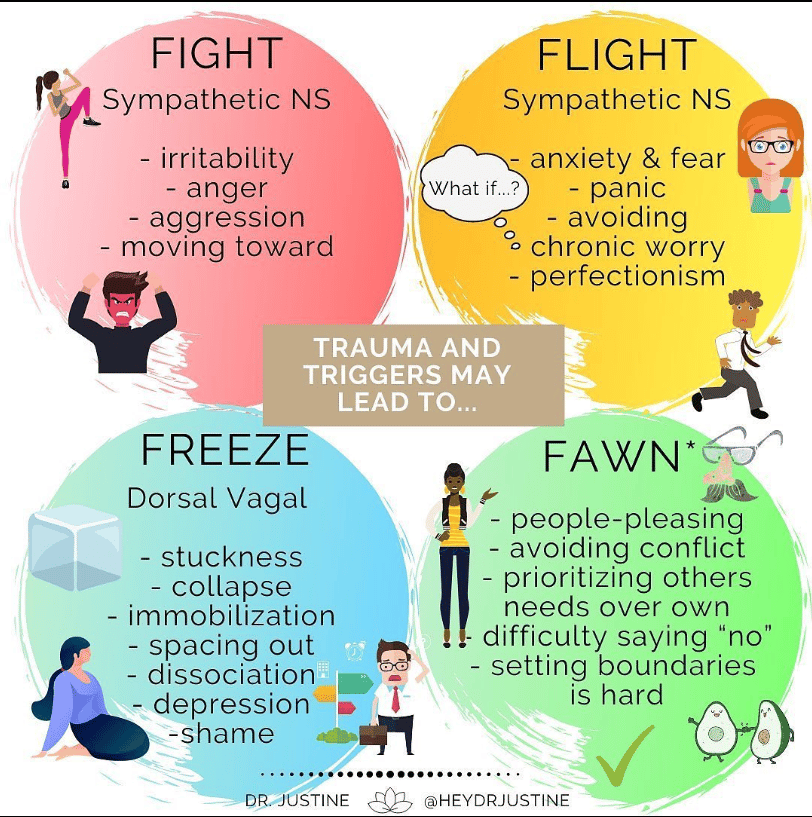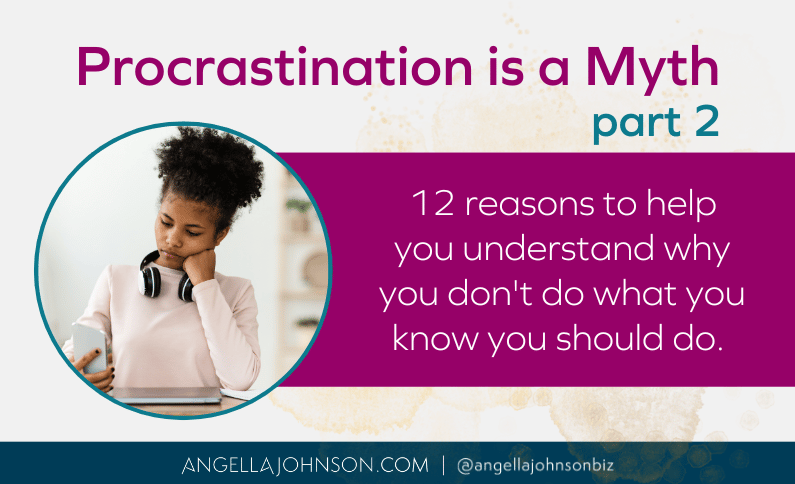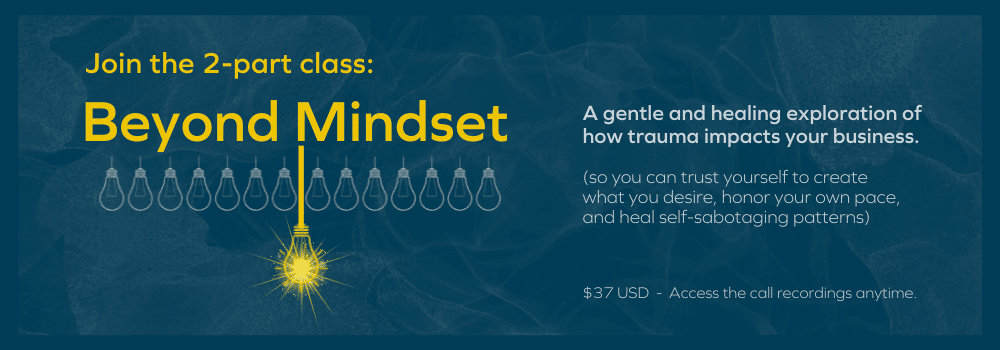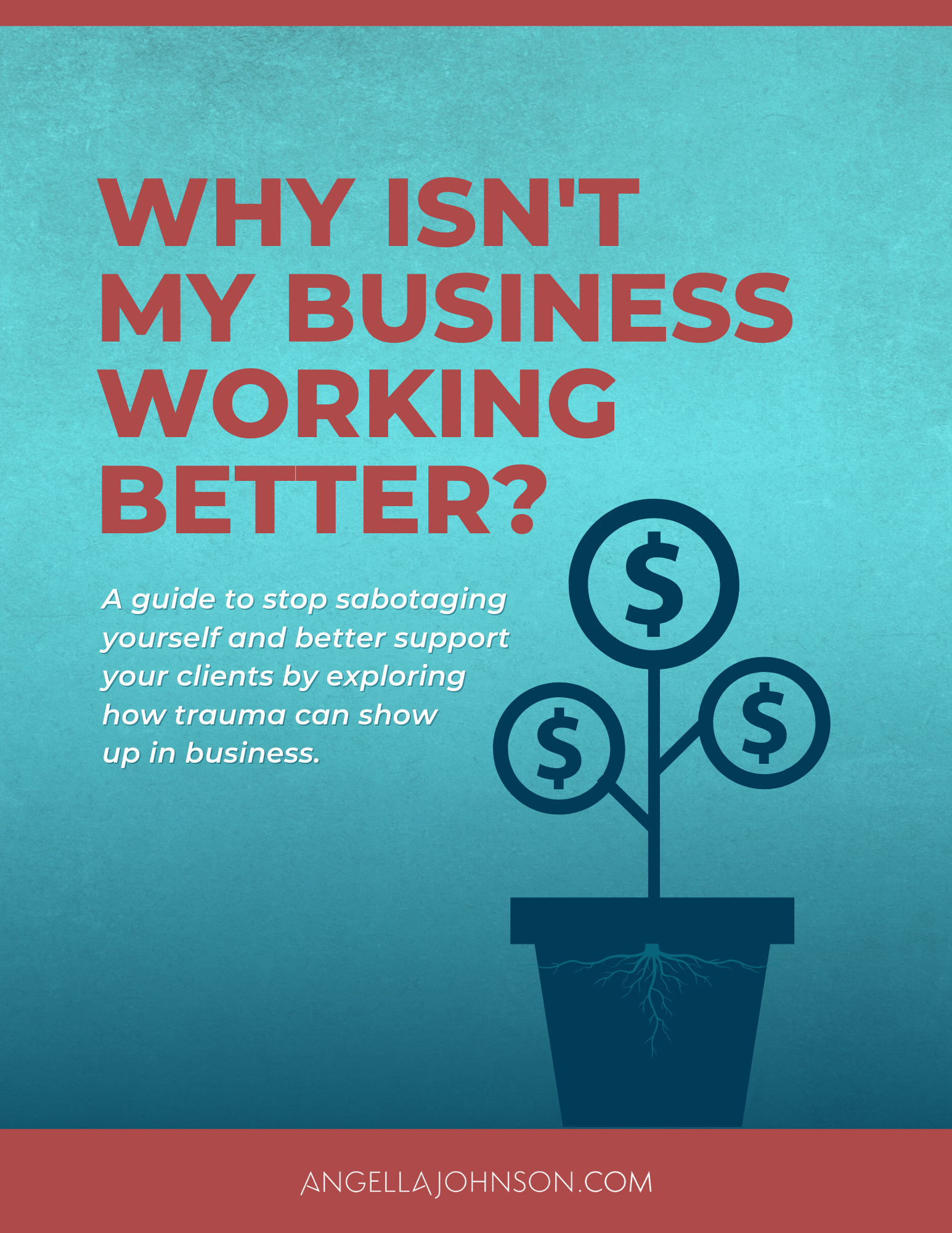Part 2: Why we really procrastinate
This is a 3-part blog series:
Part 1: What if Procrastination is a myth?
(You’re here) Part 2: 12 reasons to help you understand why you don’t do what you know you should do.
Part 3: What do we do about it?
In Part 1 of this blog series, I mentioned the three common reasons why people procrastinate and this is after studying this for a few years.
And by study, I mean: observing and talking with dozens of clients and colleagues at length about this. Changing my relationship with procrastination and sharing my observations with folks and getting a lot of feedback that confirms those observations.
Have I done a legit qualitative study about procrastination? No, but it makes me kinda want to now because I love that stuff.
As I mentioned in part 1, here is the simple version of why people don’t do the thing, whatever the thing is:
- You don’t really care about the thing.
- It’s not the right time to do the thing.
- Your nervous system doesn’t feel safe to do the thing or have the result after you do the thing.
And it’s much deeper than that.
So far, I’ve identified 12 reasons why procrastination happens and when we identify what’s really going on, we can drop the label, stop judging ourselves, and realign our energy with what we desire.
In other words, we can have self-compassion and get to the heart of what’s really going on. Here they are (not listed in any sort of priority):
- You don’t care about the thing
- You’re used to it
- Avoidance
- Anxiety
- Neurodivergence | Executive Functioning
- Overwhelm | Lack of Capacity | Burnout
- Trauma
- It’s not the right time – you need more information
- It’s a should | It’s not aligned
- Boundaries and priorities
- Mental health
- Chronic health conditions
Here we go…
1. You don’t really care about the thing
You’re a deeply caring person, right?
But if you were to be really honest about the thing you’re procrastinating about, is it possible that you don’t actually care about it that much?
Sometimes you don’t have the capacity to care because the to-do list is full of more important things, which we’ll get to as we explore this list.
Sometimes this means you’re just used to the way things are. Life has presented other more important things to focus on and that’s okay.
And sometimes, you just don’t honestly care enough about it so it doesn’t get the focus and prioritization to follow through on it.
Knowing that you don’t care about something is incredibly freeing and you can take it off of your to-do list.
2. You’re used to it
Have you ever had something around your home that initially bugged you and you told yourself you would change it but you got so used to it that you stopped paying attention to it?
The same thing could be said for things in our business.
When we get so used to the way things are, it’s hard to see what we’d like to change let alone how to change it.
Sometimes we can get used to chaos, even though it feels awful.
For years, I would have an annual meltdown in February because I didn’t do a good job of bookkeeping the year before and would scramble to get everything done for my taxes that were due in March. I would normally file an extension for my taxes and would cry before, during, and after the appointment with my accountant.
I grew up in a household that was always chaotic, especially around money. On one hand, this kind of chaos around money and feeling ashamed about not having my bookkeeping done were familiar.
On the other hand, I really hated how it felt. I made some changes, including hiring a bookkeeper, and shifted the situation over time.
It took years to stop procrastinating around bookkeeping tasks but once I understood that it was something I was used to, even if it caused me high stress, I could see why it kept happening.
I was also avoiding the money shame that I felt (we’ll get to avoidance in a moment). When I got honest about what was really going on, I could change the pattern.
3. Avoidance:
I realized that I couldn’t see the leaves on the trees as clearly I was used to. I was squinting a lot more trying to read road signs.
After getting Lasik surgery 20 years ago, I got used to 20/20 vision, so it was a real bummer to notice my vision fading.
Even so, I kept procrastinating making an eye appointment.
Why? I didn’t want to accept that I was having a hard time reading things up close and things far away. I was avoiding making an eye appointment so I could continue pretending that I wasn’t experiencing this aspect of aging.
Another example is when I realized that I was avoiding sending out regular emails to avoid the possible rejection and “hate mail.”
Or like the bookkeeping/accountant story I shared in #2 above, if I didn’t get my bookkeeping done, I didn’t have to look at my numbers, and I could avoid feeling money shame.
When you’re procrastinating something, are you really avoiding the shame or fear that you are associating with it?
4. Anxiety
I didn’t know I experienced anxiety until I was 40-years-old. I thought anxiety was only having panic attacks. Little did I know… I experienced anxiety my whole life and was shocked to discover that not everyone had the same experiences and thoughts I’ve had my entire life.
I find that a lot of people have that same misconception about anxiety, which is one more reason I normalizing conversations around mental health is incredibly healing and empowering.
Here’s how anxiety shows up for me in relation to procrastination:
I play through the possible scenarios over and over in my head until the point that it feels impossible to make a decision. I can spend an entire day (or weeks) in this energy.
It can feel like overwhelm about where to even start with a task.
It can show up like having intrusive thoughts that tell me things like, “What’s the point, it’s not going to work anyway.”
Another common thing is to put so much pressure on myself for things to be perfect, I never start. Or I start, but I don’t finish because it’s not good enough.
As you’re reading this, you might be thinking that this sounds like neurodivergence or trauma or a crossover into other areas and you’re right. There is no hard line where one of these things begins and where it ends.
5. Neurodivergence | Executive Functioning
Society, including traditional education and the online marketing world, is catered to able-bodied neurotypical folks. (We’ll get to ableism in a bit.)
If you’re not familiar with neurodivergence and what it means, and you’re a coach working with lots of different types of brains, I highly recommend getting more familiar with it because I guarantee you that you are or will work with someone who is neurodivergent. #googleit
Neurodivergence includes things like ADHD, Autism, Dyslexia, and more. There are many nuances and variations of these types of brain functions. One person who has autistic traits for example can be very different than another person with autistic traits.
Goal-setting and getting things done are not often thought of for a neurodivergent brain and the way they process information. For example, the advice of “just make a list of things you need to do, block out time in your calendar, and do it,” is ineffective and often portrayed as it’s so easy.
A neurodivergent person may struggle with a sense of time or get distracted with things that they are far more interesting than their “to-do list.” Before they know it, hours have gone by and they haven’t even looked at their to-do list.
This can be accompanied by a shame spiral because they didn’t get through their to-do list.
I heard Hannah Gadsby on this podcast (We Can Do Hard Things by Glennon Doyle) describe her autism like this: she connects through life to what’s interesting, not what’s important. She uses the example of being at an important life event, such as a funeral, and what’s important is honoring the person who died. But what’s interesting is whatever her latest obsession is and at a funeral that is perceived as being impolite or the inability to “read the room.”
This is one element and one way to describe neurodivergence and there are countless others.
Did you know that adult women are often underdiagnosed with neurodivergence, such as autism, because women are so severely understudied? Symptoms are written off as being emotional, sensitive, or hormonal.
Neurodivergence is much more commonly diagnosed in males and male children. Meanwhile, girls are often undiagnosed and women in their 40s who are experiencing hormonal changes have heightened symptoms of their neurodivergence, yet are undiagnosed so they don’t know what’s happening.
The bottom line is when a neurodivergent person doesn’t get things done, it’s often labeled with procrastination as if it’s something you can just overcome if you just had a little more willpower, which just adds to the shame.
A human with a neurodivergent brain requires different support to be able to follow through on their goals.
Executive Functioning is a term that I’ve recently been getting familiar with so here’s an official definition:
“The executive functions are a set of processes that all have to do with managing oneself and one’s resources in order to achieve a goal. It is an umbrella term for the neurologically-based skills involving mental control and self-regulation.” Source: https://www.ldonline.org/ld-topics/working-families/what-executive-functioning
One important aspect of executive functioning is the ability to initiate a task and follow it through.
If you think you may be neurodivergent or have executive dysfunction, but are unsure of what it even means, it’s worth looking into it further. You might learn a thing or two about yourself and at least, you’ll learn something about it WHEN, not if, you encounter a person with a neurodivergent brain.
6. Overwhelm | Lack of Capacity | Burnout
Are you simply overwhelmed and out of capacity to make the decisions necessary to know where to start with the task you want to get done? Do you have the capacity to see it through?
For people who have a tendency to people-please, I find this incredibly common.
For people who are going through big life stuff, this also shows up a lot. Big life stuff can be big to your system and doesn’t have to be catastrophic. I say this because I often hear people say things like, “It’s not THAT big of a deal,” meanwhile they are overwhelmed by what’s happening.
Burnout is real. Adrenal burnout is really hard.
The antidote is rest, which feels irresponsible and even impossible because not everyone has the privilege to rest.
This is often the thought when these things are at play: “The kids need to eat, laundry needs to be done, the food needs to be cooked, and when thin, pretty, privileged people talk about ‘self-care,’ I could throat punch someone, but I’m too tired to do that so instead I think about everything I should be doing and what my problem is that I’m not doing more.”
Can you relate?
7. Trauma
Trauma shows up in a lot of ways in our lives and businesses.
Not everything negative that happens results in trauma. However, a lot of experiences that people gaslight themselves into believing are “not a big deal,” in fact, an experience that your body and nervous system are processing as traumatic.
We often hear about the fight or flight response, but there are four primary trauma responses and I like what Dr. Justine has created:

Source: https://www.instagram.com/p/CScSwv2LjsR/
Another post I like of hers:

source: https://www.instagram.com/p/CdbSRtZFaC6/
Resource: How trauma shows up in business is something I’m currently researching and if you want to know more about my research, you can find more information here: https://angellajohnson.com/trauma-and-business/
What I’m finding to be the most freeing thing is by working with your nervous system rather than just trying to use positive thinking or other self-help fixes alone, you can make great strides in this area.
8. It’s not the right time | You need more information
Have you ever had that moment where you just couldn’t seem to move forward with something and then later find out that the opportunity wasn’t that great or it wasn’t aligned for you in some way?
Recently, I delayed a launch of a money program that I’ve been really excited about, and instead, I did a survey to my email list asking about what resources they were most interested in.
I was surprised when over 60% of people said they wanted messaging support over the money program I was planning on.
This also gave me the ability to pause and reflect, which is when I recognized I needed more time to integrate some additional money tools into my life from a money and trauma course I recently took.
On one hand, I could have looked at this as I was procrastinating. But in reality, it wasn’t the right time and I needed more information on what to launch next.
9. It’s a should | It’s not aligned
This often goes hand-in-hand with #8 above and here’s my favorite example of this:
To be successful, you should have your morning ritual, cleverly named the “Power Hour,” where you work out, drink your green smoothie, meditate like a pro, and read a book.
Those are all things you SHOULD want.
Is that really what you desire? Or is this a should?
If you’re not a morning person, this isn’t going to be the most aligned thing for you.
But first, you have to give yourself permission that not being a morning person is not a moral failure somehow.
Do what works for you in the way you enjoy doing it. Letting go of the shoulds will free up your mental capacity and intuition to spot the things that are in alignment for you.
10. Boundaries and priorities
Do your priorities have boundaries?
For example, I say that creativity and painting are top priorities in my life.
BUT… I don’t always have the best boundaries around my schedule to actually dedicate time to those priorities. So are they truly priorities?
Personally, I say yes, and here’s why:
Priorities can still be priorities even if they aren’t done consistently. That sounds like an oxymoron, right?
There are priorities and there are seasons for when those priorities take place. Personally, my mental health, capacity, and autoimmune conditions determine the schedule for my priorities.
If the season for your priorities never comes, then perhaps it’s time to assess what you say is a priority and give yourself permission to reprioritize.
It’s okay for priorities to change. Parents and caregivers of young children and special needs children, I’m sure you can relate to this. Hobbies you had before caring for another small human now take the back seat to raise kids.
When you can, you’ll get back to those hobbies, which were priorities at one point. Or perhaps not, because again, it’s also okay for priorities to change.
11. Mental health
In 2020, when the Covid pandemic was just beginning along with the uprising of social justice issues, I realized that my normal tools to handle everyday pressures were not working
My nervous system was shot.
This was a fertile time to address childhood trauma that I told myself for years I was over and “it was fine” because I justified that it “wasn’t THAT bad.”
I sought out therapy to help me cope and heal. I’m a big fan of therapy and in the business coaching bubble, there are people selling coaching to people when they should be advising their clients to get therapy. #isaidwhatisaid
If you are dealing with mental health challenges, whether it’s chronic or situational, please know that you are not flawed or broken, and you are most definitely not alone.
A concerning trend I see, though, is people not recognizing that mental health is impacting them and they’ll “just get over it” with the right supplements and more positive thinking.
Side note: people profiting from supplements are not mental health professionals so be aware of inaccurate advice from people who are trying to sell you something.
I value supplements and positive thinking and they can be a harmful Band-Aid to the support that someone truly needs.
12. Health, Chronic Health, Chronic Pain
It was 2013 when I was diagnosed with my second autoimmune condition. It wasn’t until several years later that I really started giving myself permission to have “off” days because I told myself if I did enough positive thinking and mindset work, then it wouldn’t affect me.
My “off” days can look like a “work-from-bed” day. Now, I pace my schedule and no longer have a day of back-to-back private clients.
I am a mostly able-bodied person operating a business and when I say “mostly,” I mean when I have a flareup, it can take me out for a few days. People looking at me have no idea that I have an invisible illness. Even people who do know, don’t understand because I “don’t look sick.”
This is about the time that all of the spiritual and self-help people are tempted to email me about how words have power and to change my language and beliefs, and by the way, here’s an essential oil that will help. So please refrain from doing that.
The key here is if you are experiencing chronic health conditions or chronic pain, I invite you to throw the word procrastination right out the door.
If things aren’t getting done, managing your health can be a full-time job. Advocating for yourself in a healthcare system is that fatphobic, ableist, and patriarchal is enraging and exhausting.
Being human means we have very human experiences. This can look like receiving a diagnosis and having to put our to-do list on hold. This can look like having pain that no one else can see and they don’t understand why you can’t do all of the things.
Do you see procrastination differently now?
This is a long list and certainly doesn’t include everything. Have I missed something obvious? DM me on IG and let me know what I can add to this list.
Hopefully, if you’ve been judging yourself (or someone else) as being a procrastinator, you can have more empathy, compassion, and honesty about what’s really going on. Only when we see what’s really happening under the surface, can we see a different solution.
Truly though, have you EVER been able to change a pattern or habit through shaming and judging yourself? Maybe there is a spurt of a short-term change, but it doesn’t last, which only adds to the frustration.
If there are goals you have that you aren’t reaching time and time again, go through this list and look at what’s under the procrastination and self-sabotage.
Now, what do we do about this? Check out part 3 of this blog series here.
Want to go back to part 1, here you go.
Resource:
If you can relate to the Trauma response as to why you’re procrastinating, check out this 2-part class for $37 USD.



